Nefeli Mandilari Director of Marketing at Vinokilo has managed to spread the vintage way of life all around Europe. Vinokilo is currently the biggest pop up event in Europe for second hand and vintage clothes. But it wasn’t always like that. The brand started in 2016 in a friends’ small apartment in Mainz, but soon after it was clear that there was a need for a drastic change in the way people consume fashion.
“We started with a small event in Mainz and had a great reception with around 400 people attending. Then we ran a bigger event in Mainz, then Frankfurt, Berlin and now there is not a western European country that we haven’t visited. This week in parallel we are in six cities in Europe.”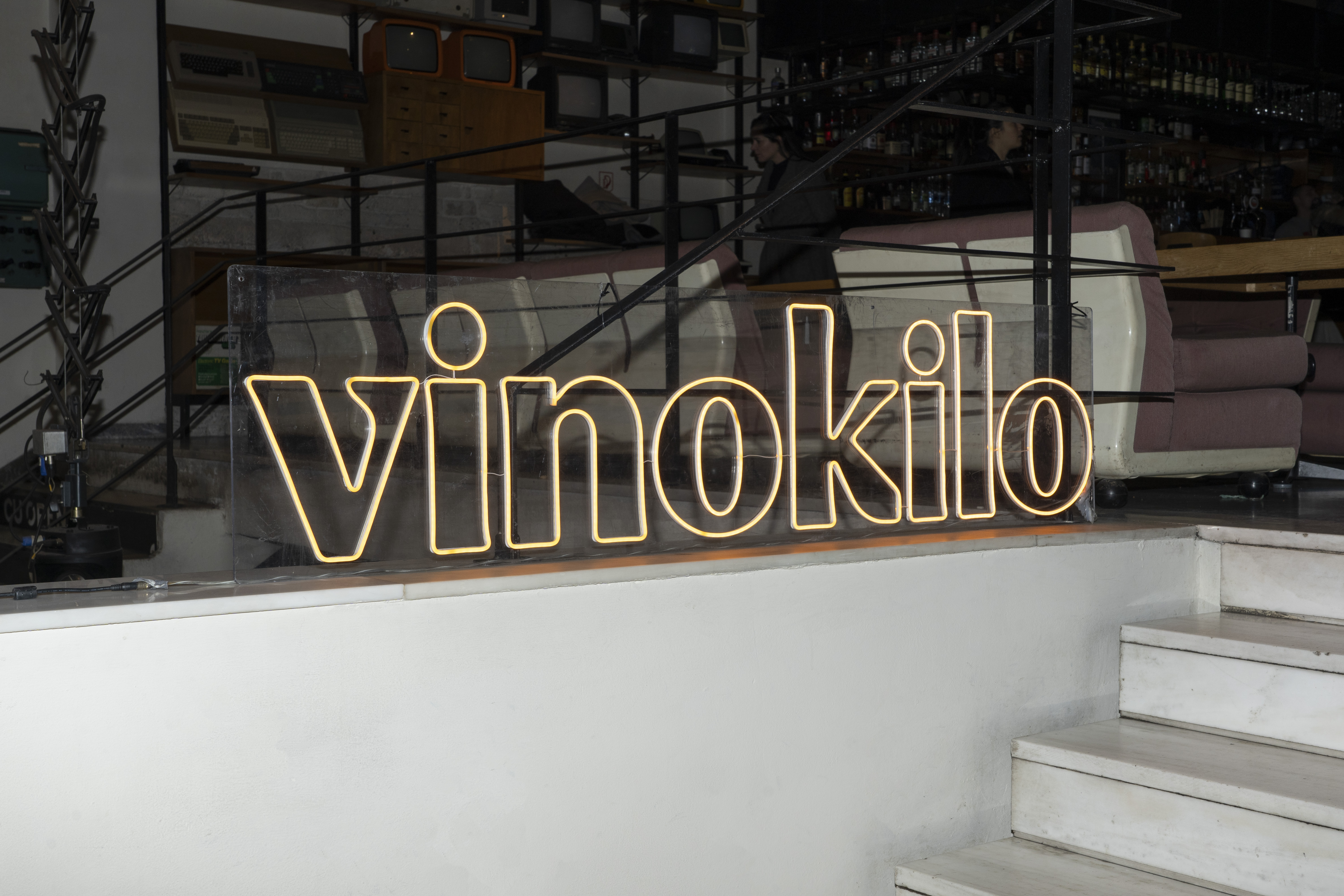 Clothing waste is a general worldwide issue. Used clothes are thrown to landfills and get treated like trash. Vinokilo’s mission starts right at that point. The clothing items come from all over the world. From Canada to Norway, basically from everywhere, but mostly developed countries. The clothes are meant to travel to oversea destinations such as Africa and Southe East Asia. A comfortable way for developed countries to get rid of their waste problems.
Clothing waste is a general worldwide issue. Used clothes are thrown to landfills and get treated like trash. Vinokilo’s mission starts right at that point. The clothing items come from all over the world. From Canada to Norway, basically from everywhere, but mostly developed countries. The clothes are meant to travel to oversea destinations such as Africa and Southe East Asia. A comfortable way for developed countries to get rid of their waste problems.
Clothes typically are found at sorting warehouses. These sorting warehouses are located all over Europe and act as an intersection where clothes are processed in accordance of quality and usability into three different categories: Can be sold, Can be sold in low income countries, Trash -to go into landfills. Following the credo "Another Man’s trash is another Man’s treasure", Vinokilo selects the clothes that believe their visitors would love the most. Vinokilo benefits from knowledge they have acquired on what items are requested by their users which enable them to make smart choices around the most popular secondhand fashion.The clothes are washed, repaired, hand folded and put into sacks. Then each item finds its way to Vinokilo’s warehouse in Mainz to begin a new life.
“A few years ago nobody wondered what happened to our worn clothes. We were throwing them away and considered them as garbage. It’s a bit sad that these huge amounts of clothes are not being reused. There are desserts all over the world that are filled with clothes and we just wait for them to decompose.” Nefeli explained.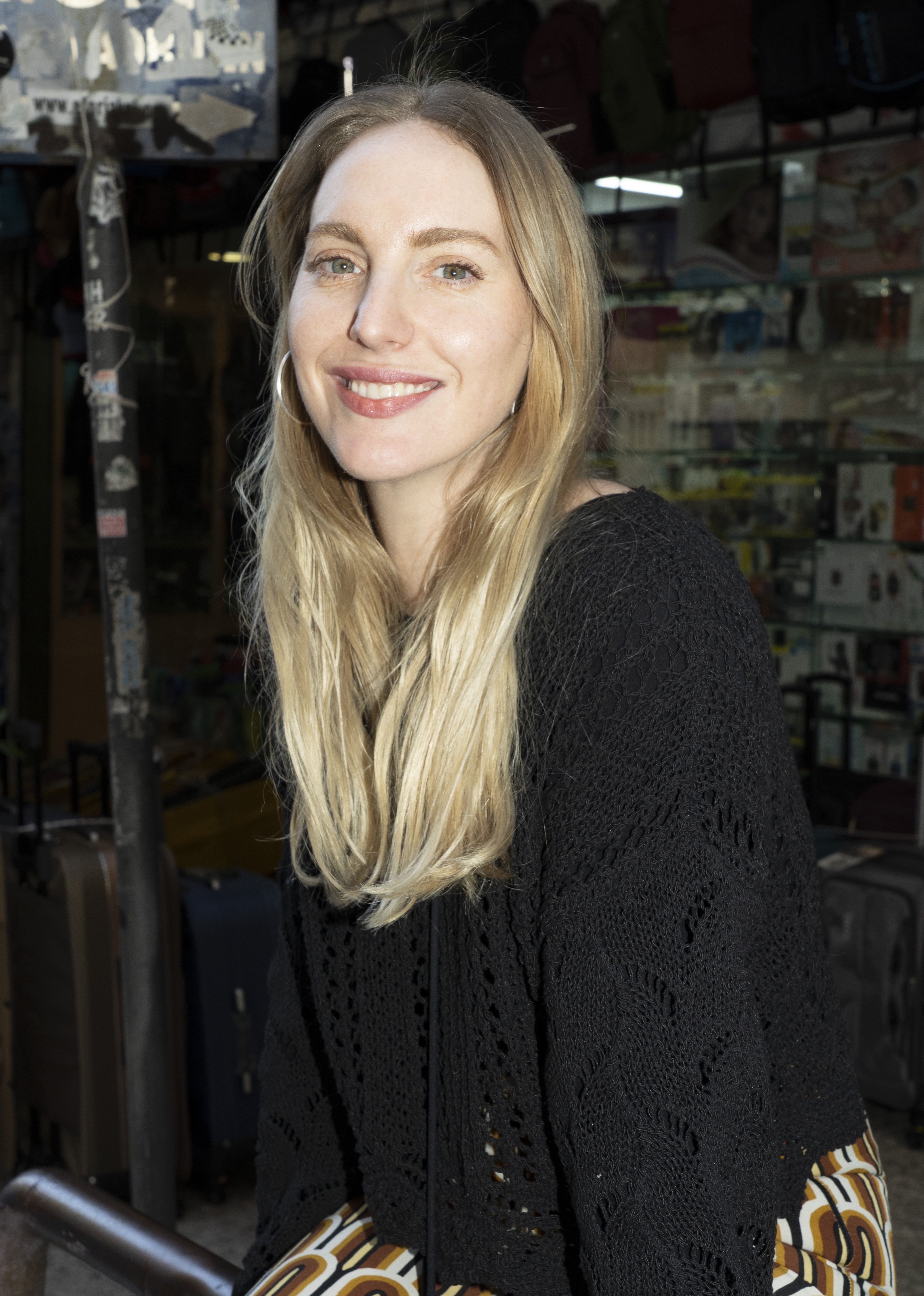 Vinokilo treats sustainability as a way of life rather than a trend. The brand makes sure every step of the process aligns with their work ethics. In 2022 they got certified by B Corp, a designation indicating that a business is meeting high standards of verified performance, accountability, and transparency on factors from employee benefits and charitable giving to supply chain practices and input materials.
Vinokilo treats sustainability as a way of life rather than a trend. The brand makes sure every step of the process aligns with their work ethics. In 2022 they got certified by B Corp, a designation indicating that a business is meeting high standards of verified performance, accountability, and transparency on factors from employee benefits and charitable giving to supply chain practices and input materials.
Nefeli commented on the process of getting the certification and how carefully the brand tries to maintain an overall green attitude at all times. “We are very proud to be part of B Corp. It was a meticulous and long process. Every part of our operations was audited, from the way we pack our clothes to how many emissions our vans create on their way to our events -even the type of the light bulbs that we use at our warehouse.”
Fast fashion and the current state of consuming clothes is more of an ecological disaster than a cultural attitude. Nefeli points out the excessive production of clothes and the necessity to take a step back and reevaluate our needs. The existing clothes could be used in many different and creative ways. Second hand clothing can also be reworked to create new pieces instead of producing new materials.
“I love clothes, but it burdens me that we have to produce so much. We're flooded with clothing items made out of polyester, perpetuated by fast fashion and ultra fast fashion companies, which contribute to pollution. Instead of constantly churning out new items, we could repurpose existing materials. You don't have to wear that vintage '70s cardigan if it's not your style, but we can transform its fabric into something new and stunning.”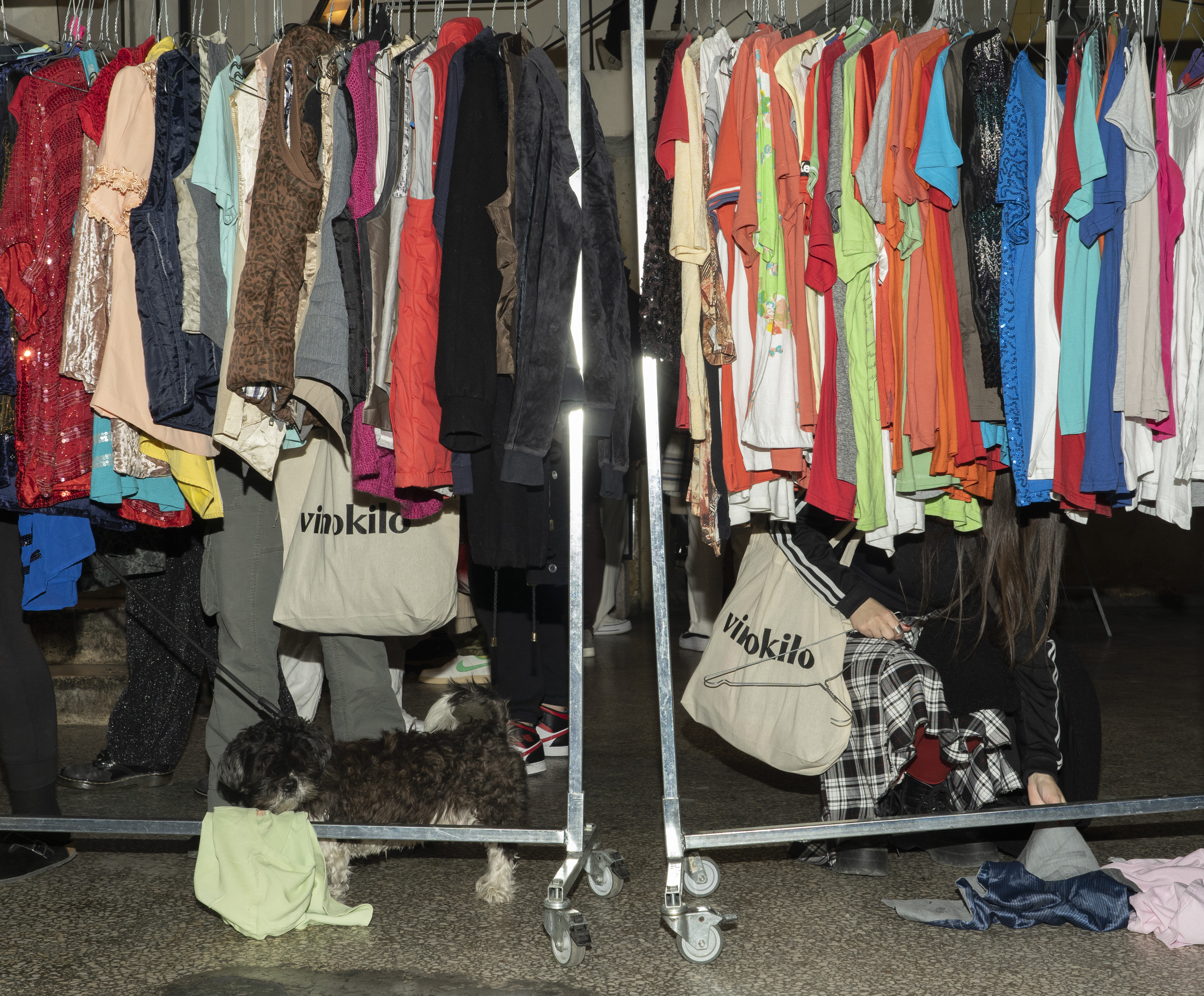 Polyester is used a lot by fast fashion brands since it’s quick to produce and easier to process in different ways. Young brands also struggle to keep prices that could make them competitive in the market while maintaining good quality for their fabrics. The solution is often using blends of different fabrics in order to become more environmentally friendly and not pricey.
Polyester is used a lot by fast fashion brands since it’s quick to produce and easier to process in different ways. Young brands also struggle to keep prices that could make them competitive in the market while maintaining good quality for their fabrics. The solution is often using blends of different fabrics in order to become more environmentally friendly and not pricey.
“Polyester is a manufactured synthetic fiber. It is a kind of plastic and is usually derived from petroleum. It doesn’t decompose easily and it’s harmful to the environment. You can produce it cheaply and quickly, but cheap and quick means harmful for the environment. Newly produced clothes made mostly out of polyester will take years to decompose and will end up in the ocean, in microplastics and eventually in our food.” Nefeli explained.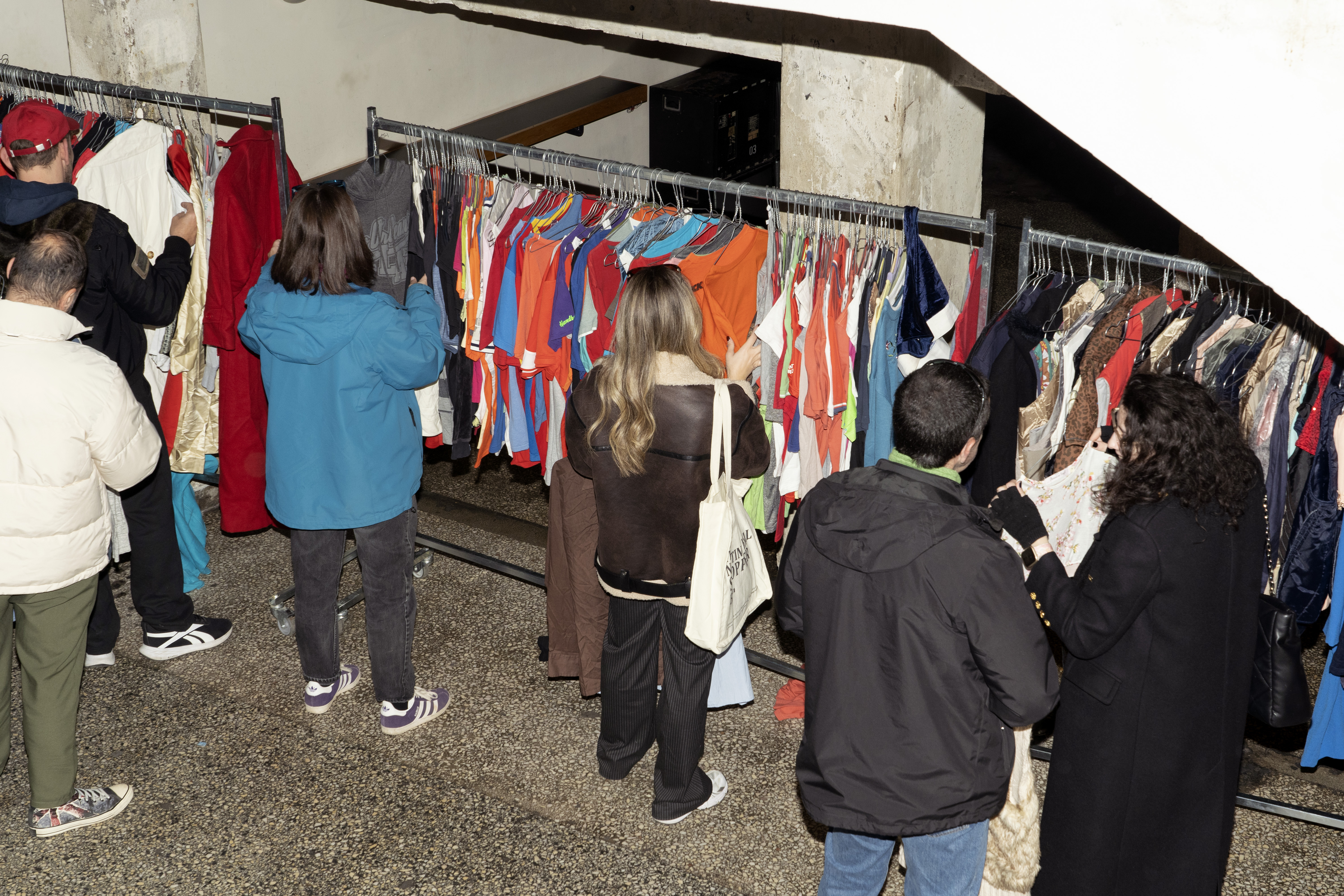 During a week full of events Nefeli talked about the reason behind their big success in vintage clothing. Vinokilo is not just another vintage kilo sale. It started at a time when there was a need for it and the brand offered much more than just clothes. Vinokilo events feel like mini festivals that include clothes, wine, music and other local businesses with their own products. Vinokilo wants to make vintage the new norm. Nefeli described the concept and pointed out that “We wanted to make vintage accessible in a fun way. We wanted to surpass the cliché of traditional thrifting, which often evokes a nostalgic past and appeals to a niche audience. Our goal was to make vintage style commercial, approachable, fun, and cool, emphasizing that it's the future of fashion. There's nothing more contemporary and aligned with our current era, both in terms of humanity and the planet, than the concept of reusing existing materials. That's our core focus.”
During a week full of events Nefeli talked about the reason behind their big success in vintage clothing. Vinokilo is not just another vintage kilo sale. It started at a time when there was a need for it and the brand offered much more than just clothes. Vinokilo events feel like mini festivals that include clothes, wine, music and other local businesses with their own products. Vinokilo wants to make vintage the new norm. Nefeli described the concept and pointed out that “We wanted to make vintage accessible in a fun way. We wanted to surpass the cliché of traditional thrifting, which often evokes a nostalgic past and appeals to a niche audience. Our goal was to make vintage style commercial, approachable, fun, and cool, emphasizing that it's the future of fashion. There's nothing more contemporary and aligned with our current era, both in terms of humanity and the planet, than the concept of reusing existing materials. That's our core focus.”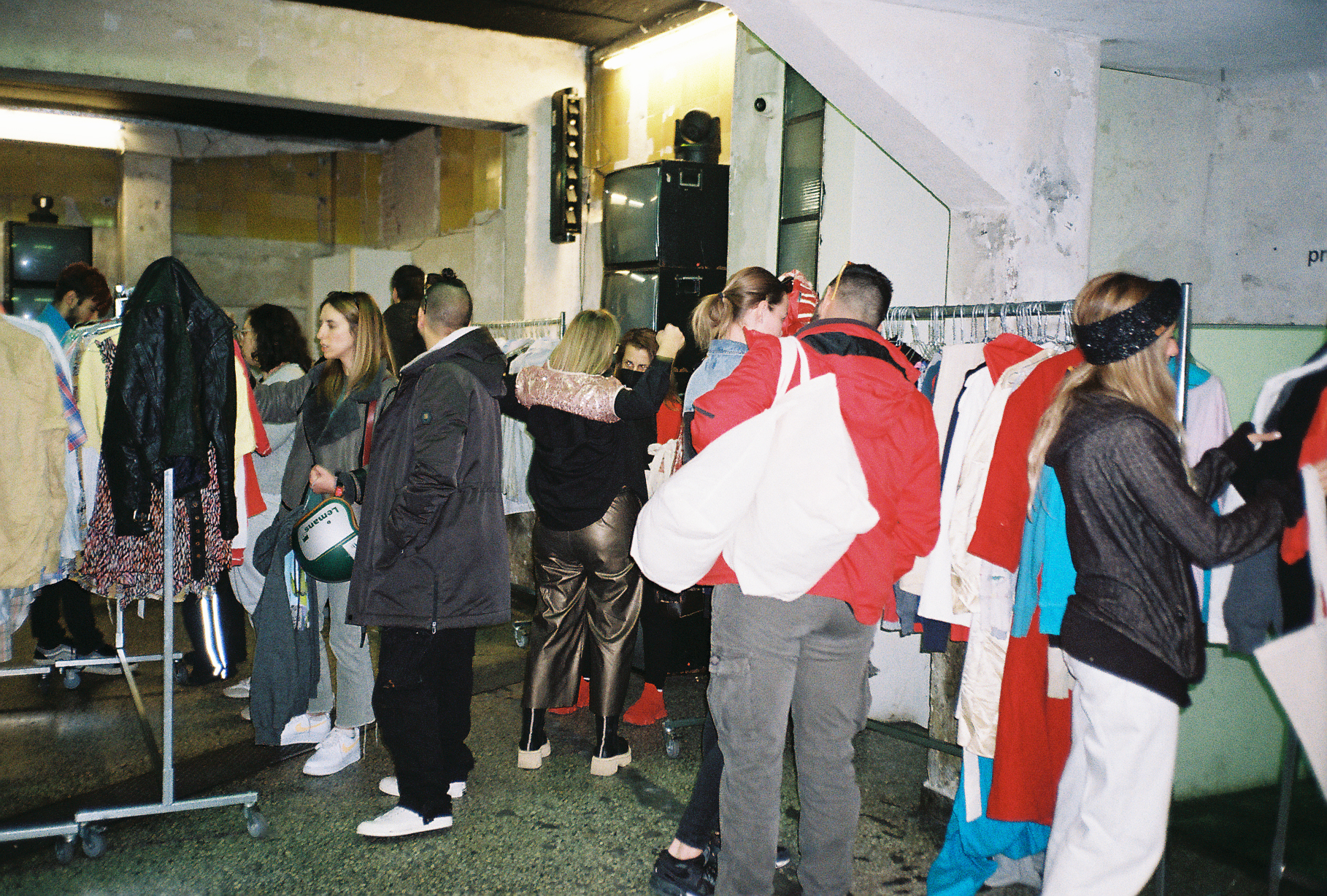
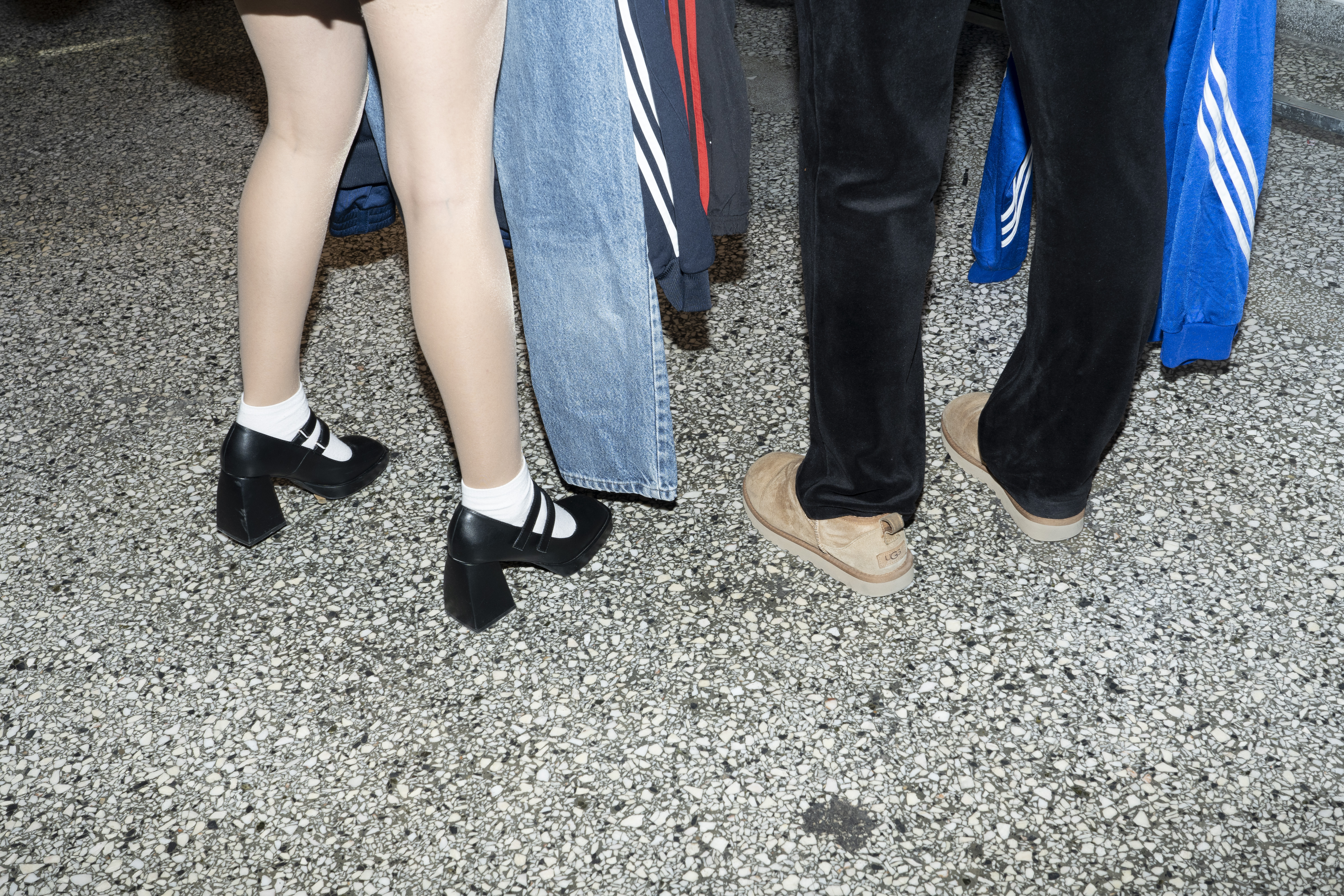 At the moment Vinokilo is having events all over Europe and it also launched a new initiative, the Give Back Bar. People can buy clothes, but they can also bring their own clothes and get a discount. Nefeli wants to make vintage cool and let clothes tell their story through different generations.
At the moment Vinokilo is having events all over Europe and it also launched a new initiative, the Give Back Bar. People can buy clothes, but they can also bring their own clothes and get a discount. Nefeli wants to make vintage cool and let clothes tell their story through different generations.
“Vinokilo extends beyond just vintage kilo sales. We aim to become your lifelong clothing partner. You can both bring your clothes and find new ones, as we promote the idea of endless clothing life cycles. Secondhand isn't merely about wearing someone else's clothes; it's the future of fashion. We exist with the mission to shift the way people view secondhand clothing.”
Photos by Dimitris Tairis
Myriam Patrou








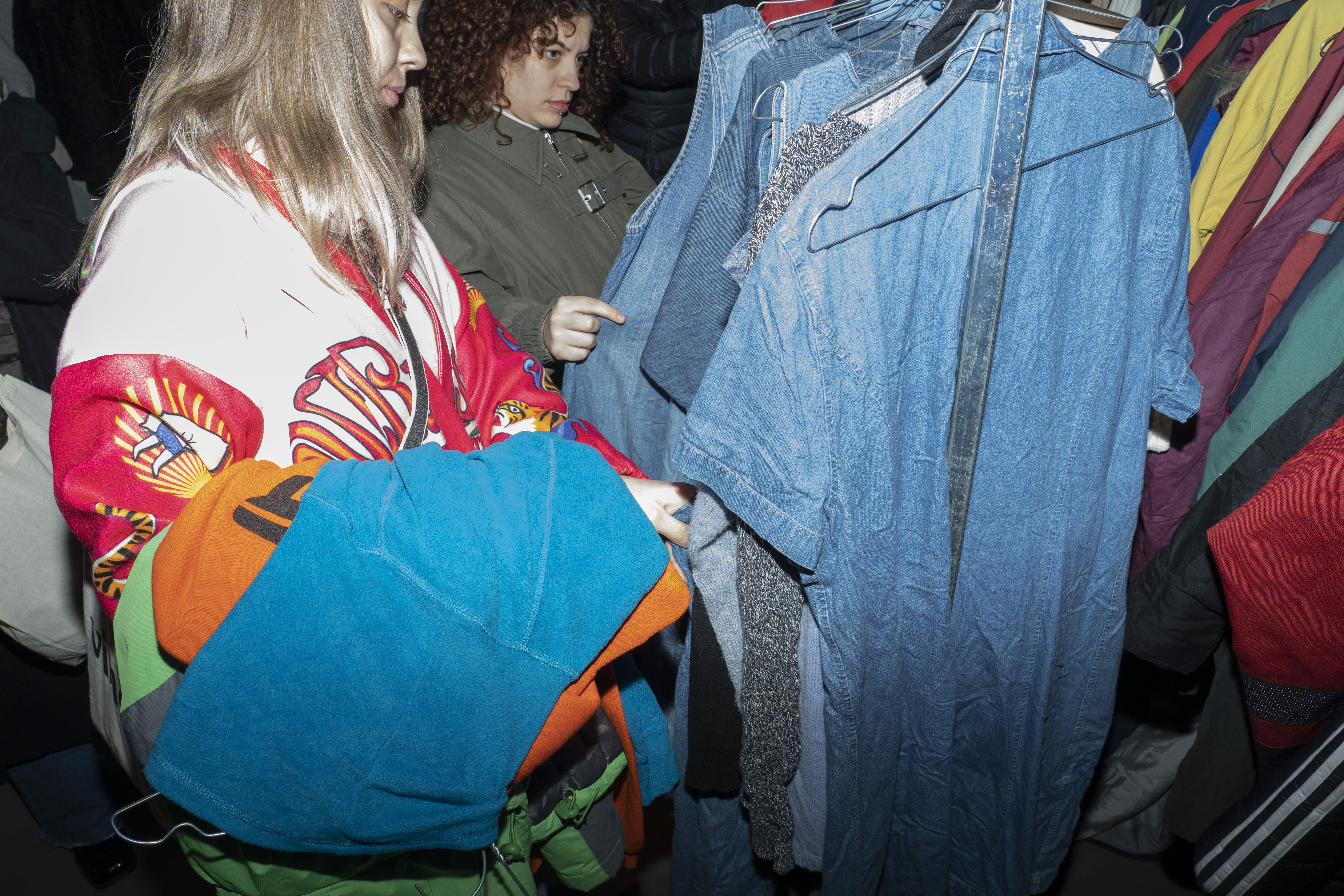
 Clothing waste is a general worldwide issue. Used clothes are thrown to landfills and get treated like trash. Vinokilo’s mission starts right at that point. The clothing items come from all over the world. From Canada to Norway, basically from everywhere, but mostly developed countries. The clothes are meant to travel to oversea destinations such as Africa and Southe East Asia. A comfortable way for developed countries to get rid of their waste problems.
Clothing waste is a general worldwide issue. Used clothes are thrown to landfills and get treated like trash. Vinokilo’s mission starts right at that point. The clothing items come from all over the world. From Canada to Norway, basically from everywhere, but mostly developed countries. The clothes are meant to travel to oversea destinations such as Africa and Southe East Asia. A comfortable way for developed countries to get rid of their waste problems. Vinokilo treats sustainability as a way of life rather than a trend. The brand makes sure every step of the process aligns with their work ethics. In 2022 they got certified by B Corp, a designation indicating that a business is meeting high standards of verified performance, accountability, and transparency on factors from employee benefits and charitable giving to supply chain practices and input materials.
Vinokilo treats sustainability as a way of life rather than a trend. The brand makes sure every step of the process aligns with their work ethics. In 2022 they got certified by B Corp, a designation indicating that a business is meeting high standards of verified performance, accountability, and transparency on factors from employee benefits and charitable giving to supply chain practices and input materials. Polyester is used a lot by fast fashion brands since it’s quick to produce and easier to process in different ways. Young brands also struggle to keep prices that could make them competitive in the market while maintaining good quality for their fabrics. The solution is often using blends of different fabrics in order to become more environmentally friendly and not pricey.
Polyester is used a lot by fast fashion brands since it’s quick to produce and easier to process in different ways. Young brands also struggle to keep prices that could make them competitive in the market while maintaining good quality for their fabrics. The solution is often using blends of different fabrics in order to become more environmentally friendly and not pricey. During a week full of events Nefeli talked about the reason behind their big success in vintage clothing. Vinokilo is not just another vintage kilo sale. It started at a time when there was a need for it and the brand offered much more than just clothes. Vinokilo events feel like mini festivals that include clothes, wine, music and other local businesses with their own products. Vinokilo wants to make vintage the new norm. Nefeli described the concept and pointed out that “We wanted to make vintage accessible in a fun way. We wanted to surpass the cliché of traditional thrifting, which often evokes a nostalgic past and appeals to a niche audience. Our goal was to make vintage style commercial, approachable, fun, and cool, emphasizing that it's the future of fashion. There's nothing more contemporary and aligned with our current era, both in terms of humanity and the planet, than the concept of reusing existing materials. That's our core focus.”
During a week full of events Nefeli talked about the reason behind their big success in vintage clothing. Vinokilo is not just another vintage kilo sale. It started at a time when there was a need for it and the brand offered much more than just clothes. Vinokilo events feel like mini festivals that include clothes, wine, music and other local businesses with their own products. Vinokilo wants to make vintage the new norm. Nefeli described the concept and pointed out that “We wanted to make vintage accessible in a fun way. We wanted to surpass the cliché of traditional thrifting, which often evokes a nostalgic past and appeals to a niche audience. Our goal was to make vintage style commercial, approachable, fun, and cool, emphasizing that it's the future of fashion. There's nothing more contemporary and aligned with our current era, both in terms of humanity and the planet, than the concept of reusing existing materials. That's our core focus.”
 At the moment Vinokilo is having events all over Europe and it also launched a new initiative, the Give Back Bar. People can buy clothes, but they can also bring their own clothes and get a discount. Nefeli wants to make vintage cool and let clothes tell their story through different generations.
At the moment Vinokilo is having events all over Europe and it also launched a new initiative, the Give Back Bar. People can buy clothes, but they can also bring their own clothes and get a discount. Nefeli wants to make vintage cool and let clothes tell their story through different generations.